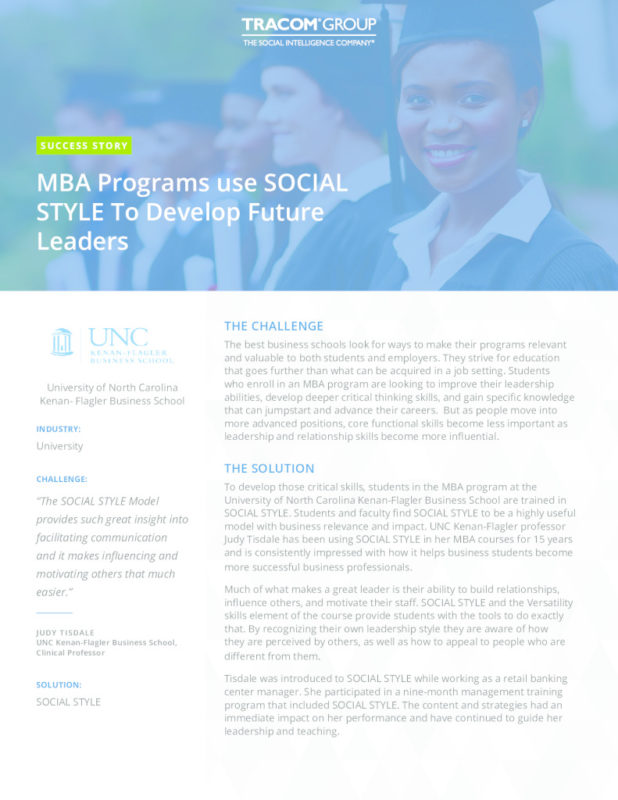To develop critical thinking skills, students in the MBA programs at the University of North Carolina Kenan-Flagler Business School are trained in SOCIAL STYLE. Students and faculty find SOCIAL STYLE to be a highly useful model with business relevance and impact. UNC Kenan-Flagler professor Judy Tisdale has been using SOCIAL STYLE in her MBA courses for 15 years and is consistently impressed with how it helps business students become more successful business professionals.
Challenge in Business Schools
The challenge faced by top business schools revolves around making their MBA programs not only educationally enriching but also profoundly relevant to both students and employers. MBA candidates often seek to bolster their leadership skills, hone critical thinking abilities, and acquire specialized knowledge that can significantly accelerate and advance their careers. As professionals progress into more advanced roles, the significance of core functional skills diminishes in favor of leadership and interpersonal abilities. The best business schools recognize this shift and aim to equip their students with the skills essential for leadership and relationship-building in the complex business landscape.
University of North Carolina Kenan-Flagler Business School and SOCIAL STYLE
The University of North Carolina Kenan-Flagler Business School has devised an innovative solution to address this challenge. Their MBA program incorporates SOCIAL STYLE as a fundamental training tool. Both students and faculty attest to the remarkable value and real-world relevance of SOCIAL STYLE. Professor Judy Tisdale, with over 15 years of experience integrating SOCIAL STYLE into her MBA programs, highlights its role in transforming business students into highly effective professionals.
Great leaders are defined not merely by their technical skills but by their capacity to forge relationships, exert influence, and inspire their teams. SOCIAL STYLE, combined with the Versatility skills component, provides students with invaluable tools to excel in these areas. By understanding their own leadership style, they gain insight into how others perceive them and how to connect effectively with individuals who have differing styles.
TRACOM’s SOCIAL STYLE
Tisdale’s journey with SOCIAL STYLE began during her tenure as a retail banking center manager, where she encountered this powerful tool in a management training program. The profound impact it had on her performance has continued to shape her leadership and teaching endeavors. Consequently, SOCIAL STYLE is now integrated into various courses at UNC Kenan-Flagler, including those in the Master’s of Accounting Program, a PhD professional skills course, and a leadership communications course focused on influencing people who aren’t directly accountable to the student. The model’s unique ability to simplify complex concepts and emphasize behavioral Style and Versatility has earned it the status of the most effective assessment tool in their programs.
SOCIAL STYLE’s primary lesson, Versatility, imparts essential skills for enhancing interactions, thereby making communication more effective. Moreover, SOCIAL STYLE encourages students to think more broadly, transcending cultural boundaries, and making them better prepared to navigate international business scenarios. The tangible workability and applicability of SOCIAL STYLE, combined with its capacity to captivate and engage students, render it an indispensable asset in UNC Kenan-Flagler’s MBA program, aligning with the evolving demands of the business world.

 New Horizons
New Horizons
 Project Management Academy
Project Management Academy
 Six Sigma Online
Six Sigma Online
 TCM Security
TCM Security
 TRACOM
TRACOM
 Velopi
Velopi
 Watermark Learning
Watermark Learning
 Login
Login

